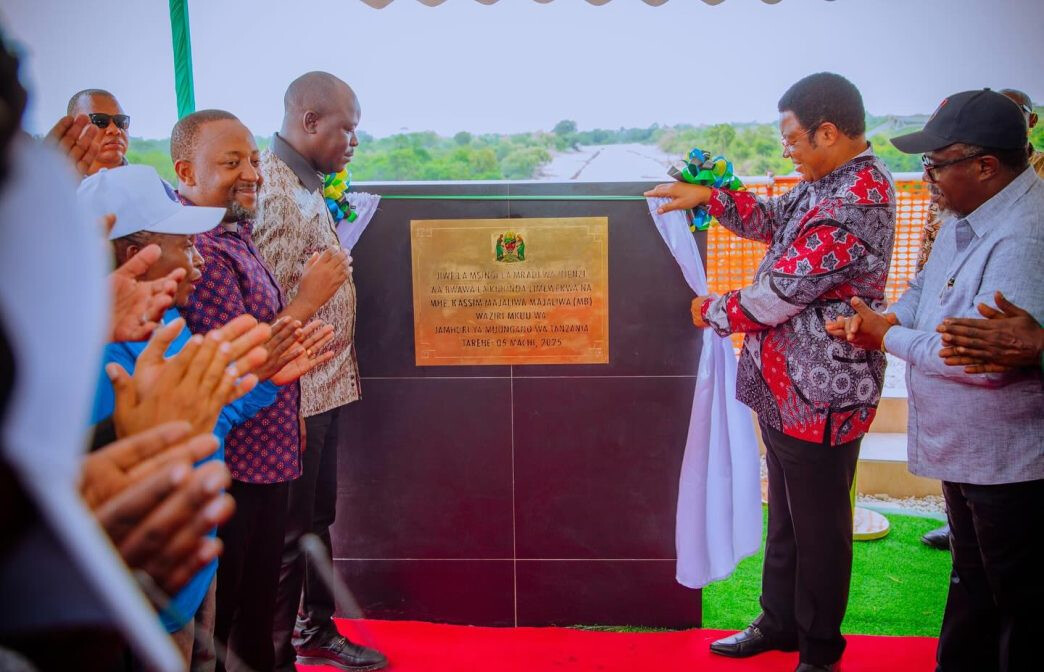
MOROGORO, Tanzania – Prime Minister Kassim Majaliwa ceremoniously laid the foundation stone for the long-awaited Kidunda Dam project in Morogoro Region, marking a significant milestone in Tanzania's efforts to enhance water security and promote sustainable environmental management. The 335.8 billion Tanzanian Shilling (approximately $130 million USD) project, with a storage capacity of 190 billion liters of water, is currently 28 percent complete and is poised to transform the region's water landscape.
Addressing a gathering of officials and local residents, Prime Minister Majaliwa underscored the critical importance of environmental conservation and responsible water resource management. "Every Tanzanian, wherever they are, must prioritize environmental conservation and water source management," he stated. "If we do not take this seriously, we will continue facing challenges. Conservation of water sources should be a permanent agenda and discussed at all decision-making levels."
The Prime Minister called upon regional and district authorities to proactively identify and safeguard critical water sources, emphasizing the need for collaborative efforts between the government and citizens. He stressed that stringent measures must be taken against those who violate environmental laws. "We must work together—both the government and citizens—to identify and protect all water sources. Anyone violating these laws must be held accountable," he added.
Recognizing the crucial role of public awareness, Majaliwa urged water authorities to intensify educational campaigns on the significance of environmental conservation and water resource management to ensure a reliable water supply across the country. He also highlighted the need for sustainable agricultural and livestock practices to prevent environmental degradation and water source depletion.
To incentivize environmental stewardship, the Prime Minister encouraged rural and watershed authorities to develop reward programs for villages that excel in conservation efforts. "If a village is performing well in environmental conservation, it should be rewarded to further promote environmental preservation campaigns," he emphasized.
Furthermore, Majaliwa directed water authorities to prioritize water supply services for villages located near water sources, thereby incentivizing their active participation in resource protection. "This project will only be sustainable if the water sources feeding into the Kidunda Dam are protected," he stressed, urging residents to take ownership of safeguarding these vital resources.
Minister for Water Jumaa Aweso assured that the ministry is fully committed to the timely completion of the Kidunda Dam, a project envisioned by the nation's founding father, Mwalimu Julius Nyerere, nearly 60 years ago. He credited President Samia Suluhu Hassan's leadership for driving the project's realization, aiming to ensure a reliable water supply nationwide.
Eng. Mwajuma Waziri, Permanent Secretary of the Ministry of Water, provided detailed insights into the project's multifaceted benefits. Once completed, the Kidunda Dam will significantly improve the supply of clean water for domestic use, agriculture, and industries. "This project will ensure a continuous water supply from the Ruvu River, providing an average of 24,000 liters per second, which will meet water demands, especially during drought periods," she explained.
The project encompasses several critical infrastructure developments, including the construction of a 75 km gravel road from Ngerengere to Kidunda and a 101 km transmission line from Kidunda to Chalinze, connecting the dam to the national grid.
Addressing the long-term sustainability of the dam, Eng. Waziri emphasized that the government, through the Wami/Ruvu Basin Water Board, is actively implementing conservation and management strategies for the dam's feeder water sources. These efforts include the issuance of land use certificates and the demarcation of permanent boundaries in the Mvuha, Mgeta, Ruvu, and Ngerengere River catchments. The Wami/Ruvu Basin is a vital water resource for a large portion of Tanzanian population and industry.
The Kidunda Dam project represents a significant investment in Tanzania's water infrastructure, aiming to enhance the nation's resilience to climate change and ensure a sustainable water supply for future generations. The project's holistic approach, integrating infrastructure development with environmental conservation and community engagement, sets a precedent for sustainable water resource management in the region.
[Copyright (c) Global Economic Times. All Rights Reserved.]






























